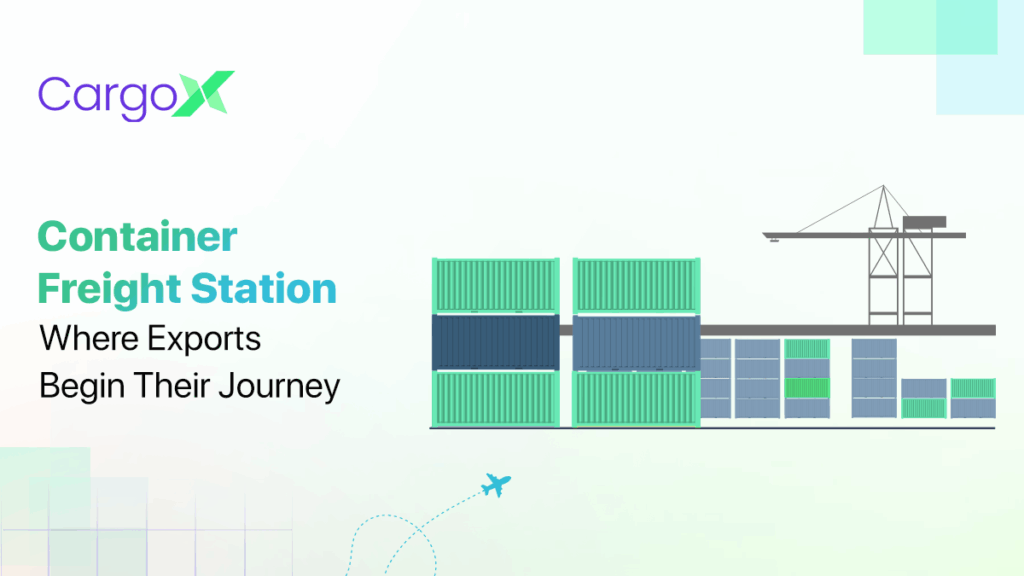Why Are Container Freight Stations Crucial for Exports?
A Container Freight Station (CFS) is a logistics facility near ports or railway hubs where cargo is consolidated, de-consolidated, and stored for export or import. It simplifies shipping for LCL (Less than Container Load) and FCL (Full Container Load) shipments, reduces port congestion, and ensures faster, organized customs clearance.
As businesses expand globally, seamless logistics and shipping are crucial. Containerized shipping has transformed the way goods are exported and imported, making processes faster and more efficient. Container Freight Stations (CFS) are central to this ecosystem, especially for LCL shipments, helping exporters and importers save time, reduce costs, and streamline operations.

What is a Container Freight Station (CFS)?
A CFS is a warehouse or facility near ports or railway terminals used to consolidate and de-consolidate shipments.
- Consolidation: Combining multiple LCL shipments into one full container (FCL).
- De-consolidation: Separating a container into individual shipments at the destination.
- Temporary Storage: Acts as a secure location for cargo awaiting export or import clearance.
India has over 160 CFS facilities, operated by private players or port authorities.
Why Use a Container Freight Station?
CFS has become integral to modern shipping because it:
- Centralizes cargo handling for efficient operations
- Simplifies customs clearance
- Reduces port congestion
- Provides temporary storage for imports and exports
Types of CFS:
- Origin CFS: Manages cargo before leaving India.
- Destination CFS: Handles cargo after arrival in India or the importing country.
What Are the Key Functions of a CFS?
- Planning container loads for export.
- Consolidating LCL shipments into full containers.
- De-consolidating containers at the destination.
- Loading and unloading containers.
- Sealing containers with identification marks.
- Managing transportation to ports or terminals.
- Tracking container status before and after shipping.
- Maintaining containers for safety and efficiency.
- Assisting with customs clearance.
What Is Import and Export Process at CFS?
Export Process:
- Exporter brings goods to CFS with a shipping bill.
- CFS records receipt and cargo details.
- Customs clears goods and issues a shipping bill with “Let Export Order.”
- CFS consolidates, seals containers, and dispatches them to the port.
Import Process:
- Container arrives at the port with an Import General Manifest (IGM).
- Cargo is forwarded to the destination CFS.
- CFS offloads cargo and initiates customs clearance.
- Importer files a Bill of Entry; customs issues “Out of Charge” order.
- CFS dispatches cleared cargo to the importer.
Acting as an extension of the port, CFS reduces congestion and streamlines shipping operations.
CFS Charges
CFS levies charges based on:
- Container size: 20ft, 40ft, 45ft
- Cargo type: Reefer, hazardous, ODC (over-dimensional cargo)
- Services: Loading, unloading, consolidation, storage, customs facilitation
Tip: Understanding these charges prevents shipment delays, extra costs, and compliance issues.
Significance for Businesses
- Reduces shipping errors and delays
- Ensures safe cargo handling
- Simplifies LCL shipments for small exporters
- Acts as a port extension, decongesting main terminals
- Provides a one-stop solution for export-import operations
With a reliable CFS network like Shiprocket CargoX, businesses can enjoy seamless delivery, customs compliance, and optimized cargo management.
Conclusion
A Container Freight Station (CFS) is more than just a warehouse – it’s a critical hub in India’s export-import ecosystem. By consolidating shipments, facilitating customs clearance, and providing temporary storage, CFS ensures your cargo moves efficiently, safely, and cost-effectively from origin to destination. For businesses aiming to scale exports or simplify import logistics, partnering with a trusted CFS network like Shiprocket CargoX guarantees smoother operations and faster delivery times, making global trade simpler than ever.
CFS handles LCL shipments near ports, while ICD (Inland Container Depot) manages FCL containers inland with customs clearance.
Yes, it’s ideal for LCL shipments, helping small exporters consolidate cargo and reduce costs.
It ensures goods are inspected, documented, and cleared, reducing port delays.
No, charges vary by container size, cargo type, and services provided.
It simplifies logistics, consolidates shipments, provides temporary storage, and ensures faster, smoother exports.




